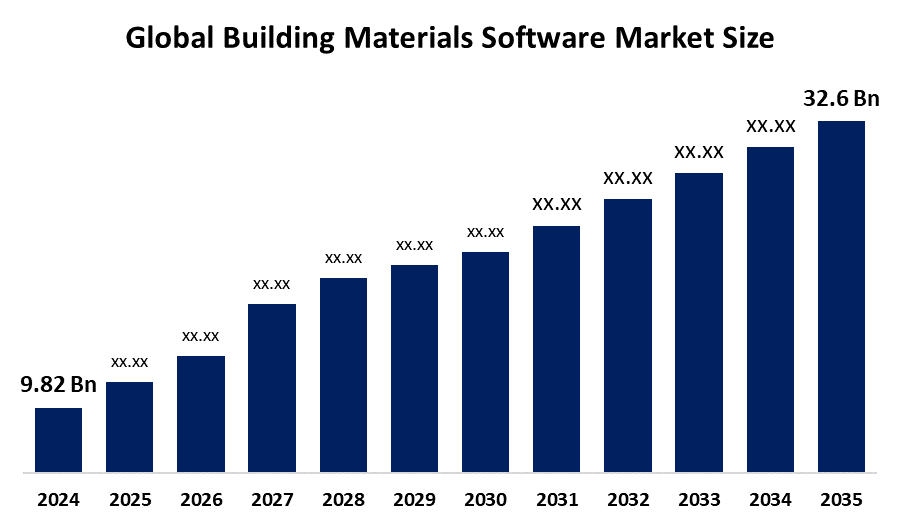
Top 50 Companies in Building Materials Software Market: Statistics Report Till 2035
RELEASE DATE: Aug 2025 Author: Spherical InsightsRequest Free Sample Speak to Analyst
Description
According to a research report published by Spherical Insights & Consulting, The Global Building Materials Software Market Size is projected To Grow from USD 9.82 Billion in 2024 to USD 32.6 Billion by 2035, at a CAGR of 10.52% during the forecast period 2025–2035. The market for building materials software is driven by rapid technological advancements such as building information modeling (BIM) and artificial intelligence, which enhance efficiency and collaboration in construction projects.
Introduction
The Global Construction Materials Market Size refer to the software market digital platforms, and equipment that are designed tools designed to streamline the management, selling, distributing, and tracking of construction materials in the construction supply chain. These software solutions help manufacturers, distributors, contractors, and retailers manage inventory, automate order processing, generate quotes, and track delivery efficiently. The growing changes towards digitization in the construction industry, combined with increasing demand for real-time data access, are driving market expansion. Integration with cloud-based solutions, mobile accessibility, and enterprise resource planning (ERP) systems is making these platforms more versatile and scalable.
Navigate Future Markets with Confidence: Insights from Spherical Insights LLP
The insights presented in this blog are derived from comprehensive market research conducted by Spherical Insights LLP, a trusted advisory partner to leading global enterprises. Backed by in-depth data analysis, expert forecasting, and industry-specific intelligence, our reports empower decision-makers to identify strategic growth opportunities in fast-evolving sectors. Clients seeking detailed market segmentation, competitive landscapes, regional outlooks, and future investment trends will find immense value in the full report. By leveraging our research, businesses can make informed decisions, gain a competitive edge, and stay ahead in the transition toward sustainable and profitable solutions.
Unlock exclusive market insights - Download the Brochure now and dive deeper into the future of the Building Materials Software Market.
Building Materials Software Market Size & Statistics
- The Market Size for Building Materials Software Was Estimated to be worth USD 9.82 Billion in 2024.
- The Market Size is Going to Expand at a CAGR of 10.52% between 2025 and 2035.
- The Global Building Materials Software Market Size is anticipated to reach USD 32.6 Billion by 2035.
- North America is expected to generate the highest demand during the forecast period in the Building Materials Software Market
- Asia Pacific is expected to grow the fastest during the forecast period in the Building Materials Software Market.

Regional growth and demand
Asia Pacific is expected to grow the fastest during the forecast period in the Building Materials Software market. Large-scale urbanization, strong economic growth, and a rise in building projects around the region are driving the fast expansion. There is a greater need for sophisticated software solutions as a result of significant infrastructure and real estate investments made by nations like China and India. Additionally, the Asia Pacific region's emphasis on technology developments, pro-business government regulations, and the rise of emerging markets all help to accelerate the use of building materials software.
North America is expected to generate the highest demand during the forecast period in the Building Materials Software market. The North American region's prosperity is fueled by sophisticated infrastructure, widespread adoption of technology, and significant construction activity in the commercial, residential, and industrial sectors. The need for building materials software is greatly influenced by the region's strong investment capacity, emphasis on innovation, and R&D.
Top 10 trends in the Building Materials Software Market
- Cloud-based deployment for remote accessibility
- Integration with Building Information Modeling (BIM) systems
- Use of AI for demand forecasting and inventory optimization
- Mobile applications for field operations and order tracking
- Real-time analytics dashboards for decision-making
- Automated quotation and invoicing systems
- IoT-enabled material tracking and asset management
- Enhanced cybersecurity measures for sensitive project data
- Industry-specific customization for different building material segments
- Subscription-based software-as-a-service (SaaS) models
1. Cloud-based deployment for remote accessibility
In the market for building materials software, cloud-based platforms are quickly taking the lead because they give distributors, contractors, and suppliers access to real-time data from any location. This feature facilitates on-site decision-making, remote project management, and multi-location enterprises. Cloud solutions lower IT overhead and enhance stakeholder collaboration with low upfront infrastructure expenses and automatic updates.
2. Integration with Building Information Modeling (BIM) systems
More precise material quantity takeoffs, cost estimation, and project planning are made possible by integrating building materials software with BIM. Businesses can steer clear of overspending or underestimating needs by directly connecting design data with procurement processes. Additionally, this integration improves communication between contractors, engineers, and architects, which reduces delays and cost overruns.
3. Use of AI for demand forecasting and inventory optimization
Predicting material demand using historical data, seasonal patterns, and project timeframes is a significant use of artificial intelligence. Systems with AI capabilities can automatically modify inventory levels to avoid shortages or overstocks. This predictive ability ensures that essential supplies are available when needed, improves cash flow, and eliminates waste.
4. Mobile applications for field operations and order tracking
On-site supervisors can use their smartphones or tablets to place orders, monitor delivery, and check stock levels thanks to mobile-enabled building materials software. By doing this, delays brought on by a lack of communication between offices and job sites are eliminated. Additionally, real-time delivery status updates from drivers are possible through mobile apps, which improves contractors' understanding of supply schedules.
5. Real-time analytics dashboards for decision-making
Advanced analytics features in contemporary building materials software allow for the visualisation of important data, including supplier performance, order fulfilment rates, and inventory turnover. Executives and managers may swiftly make well-informed, data-driven choices thanks to these dashboards. Overall operational efficiency is improved by the capacity to identify bottlenecks, track KPIs in real time, and keep an eye on project expenses.
Empower your strategic planning:
Stay informed with the latest industry insights and market trends to identify new opportunities and drive growth in the building materials software market. To explore more in-depth trends, insights, and forecasts, please refer to our detailed report.
Top 15 Companies Leading the Building Materials Software Market
- ECi Spruce
- NetSuite
- Siemens AG
- Ponderosa
- Oneir
- Pure Technology
- Kerridge
- Epicor
- S2K
- Agility
- WoodPro InSight
- MRPEasy
- Honeywell International Inc.
- RealSTEEL
- Others
1. ECi Spruce
Headquarters: United States
ECi Spruce, which has its headquarters in Fort Worth, Texas, focuses on software solutions for merchants of building supplies and lumber. Accounting, delivery scheduling, point of sale, and inventory management features are all included in its cloud-based platform. Spruce provides real-time data and mobile access to help small and mid-sized providers increase operational efficiency.
2. NetSuite
Headquarters: United States
NetSuite, a top cloud ERP company with its headquarters in Austin, Texas, provides all-inclusive supply chain management solutions for building materials. Financials, inventory management, CRM, and e-commerce are all integrated into a single platform by its software. Because of its adaptability, NetSuite may be used by both big distributors and small suppliers.
3. Siemens AG
Headquarters: Germany
Siemens AG, which has its headquarters in Munich, offers cutting-edge digital solutions for managing building materials and construction that are well integrated with industrial automation systems. Its software solutions provide smart logistics, predictive maintenance, and effective resource allocation for building supply chains by connecting to IoT devices.
4. Epicor Software Corporation
Headquarters: United States
Epicor, a Texas-based company, provides ERP systems designed specifically for distributors and suppliers of building materials. Data-driven decision-making, automated order processing, and real-time inventory tracking are all supported by its solutions. Epicor is renowned for its industry-specific modules that improve customer service and supply chain efficiency.
5. Honeywell International Inc.
Headquarters: United States
Honeywell, which has its headquarters in Charlotte, North Carolina, provides building materials management systems that are integrated with its portfolio of IoT and industrial automation. Its software is designed to improve delivery logistics, increase the accuracy of material tracking, and optimise warehouse operations. In its digital platforms for the construction industry, Honeywell also places a strong emphasis on cybersecurity.
Are you ready to discover more about the Building Materials Software market?
The report provides an in-depth analysis of the leading companies operating in the global building materials software market. It includes a comparative assessment based on their product portfolios, business overviews, geographical footprint, strategic initiatives, market segment share, and SWOT analysis. Each company is profiled using a standardized format that includes:
Company Profiles
- ECi Spruce
- Business Overview
- Company Snapshot
- Products Overview
- Company Market Share Analysis
- Company Coverage Portfolio
- Financial Analysis
- Recent Developments
- Merger and Acquisitions
- SWOT Analysis
- NetSuite
- Siemens AG
- Ponderosa
- Oneir
- Pure Technology
- Kerridge
- Epicor
- S2K
- Agility
- WoodPro InSight
- MRPEasy
- Honeywell International Inc.
- RealSTEEL
- Others
Conclusion
The building materials software market size is rising steadily as the construction sector uses digital solutions more and more to enhance supply chain monitoring, inventory control, and operational efficiency. With the help of sophisticated infrastructure and significant software providers, North America leads the world in adoption, while Asia-Pacific is predicted to develop at the highest rate because of massive infrastructure projects and growing urbanisation. The sourcing, management, and delivery of construction materials are changing due to trends like AI-powered forecasting, BIM integration, IoT-enabled tracking, and SaaS deployment models.
About the Spherical Insights & Consulting
Spherical Insights & Consulting is a market research and consulting firm which provides actionable market research study, quantitative forecasting and trends analysis provides forward-looking insight especially designed for decision makers and aids ROI.
Which is catering to different industry such as financial sectors, industrial sectors, government organizations, universities, non-profits and corporations. The company's mission is to work with businesses to achieve business objectives and maintain strategic improvements.
CONTACT US:
For More Information on Your Target Market, Please Contact Us Below:
Phone: +1 303 800 4326 (the U.S.)
Phone: +91 90289 24100 (APAC)
Email: inquiry@sphericalinsights.com, sales@sphericalinsights.com
Contact Us: https://www.sphericalinsights.com/contact-us
Need help to buy this report?